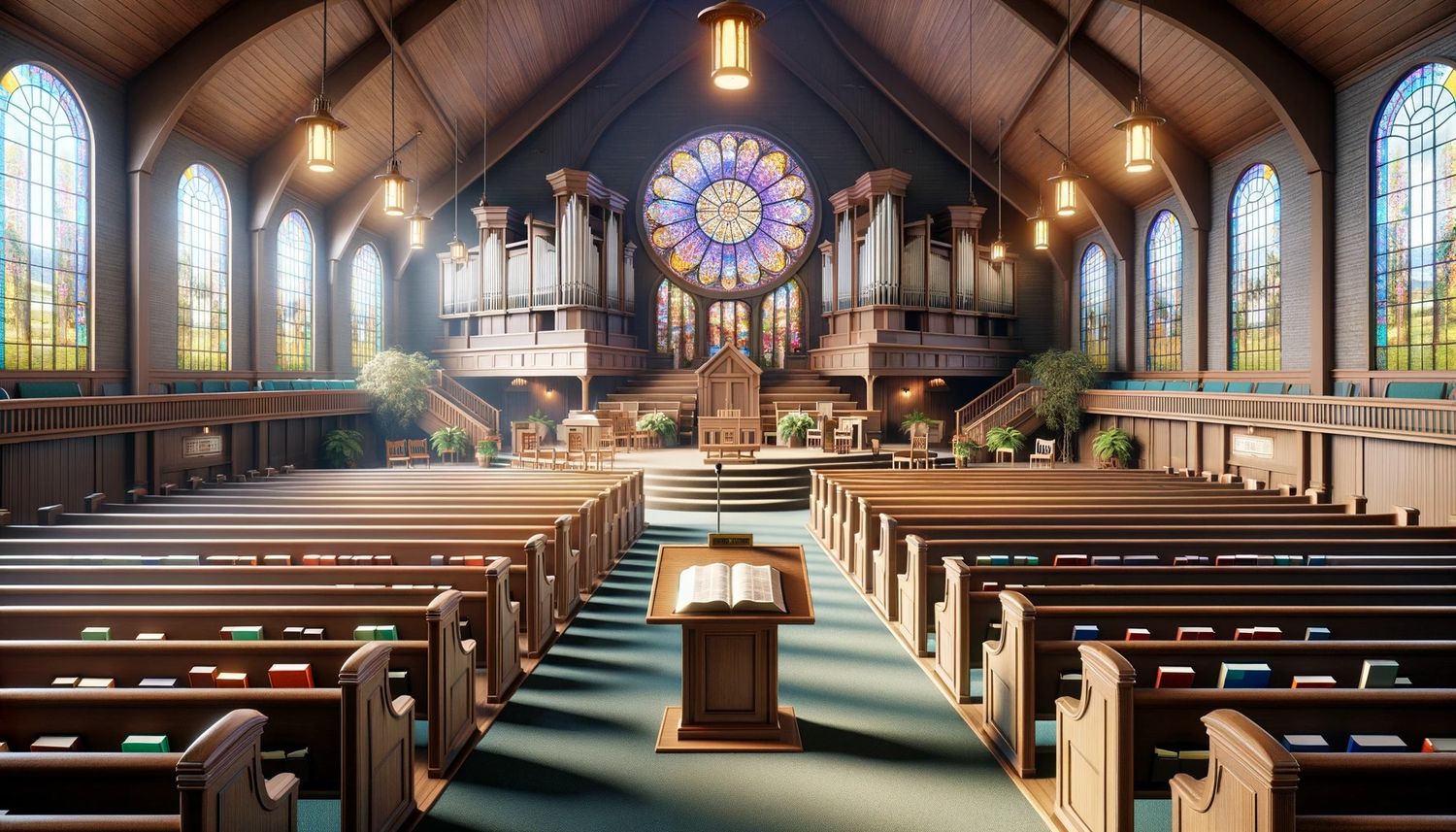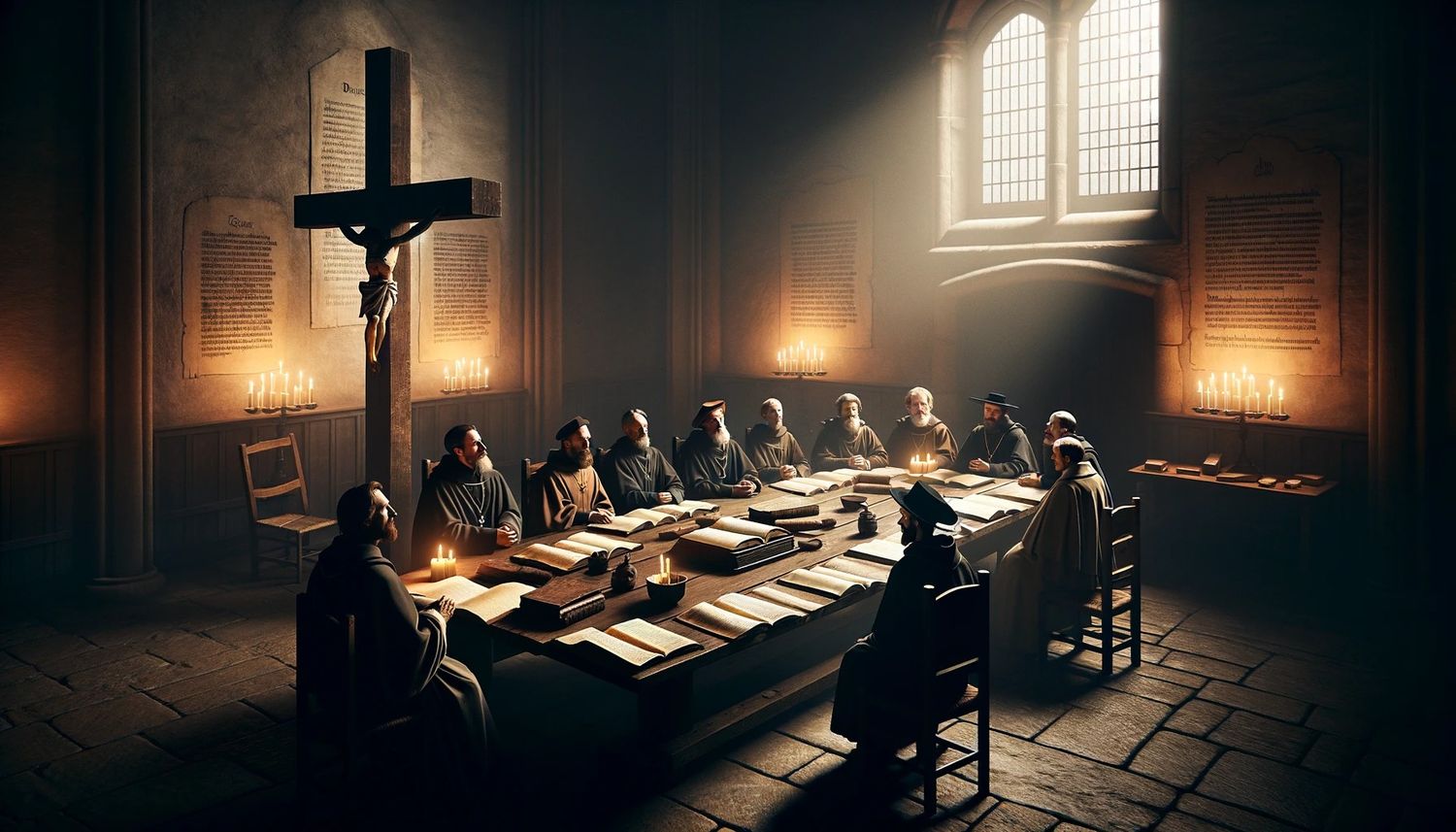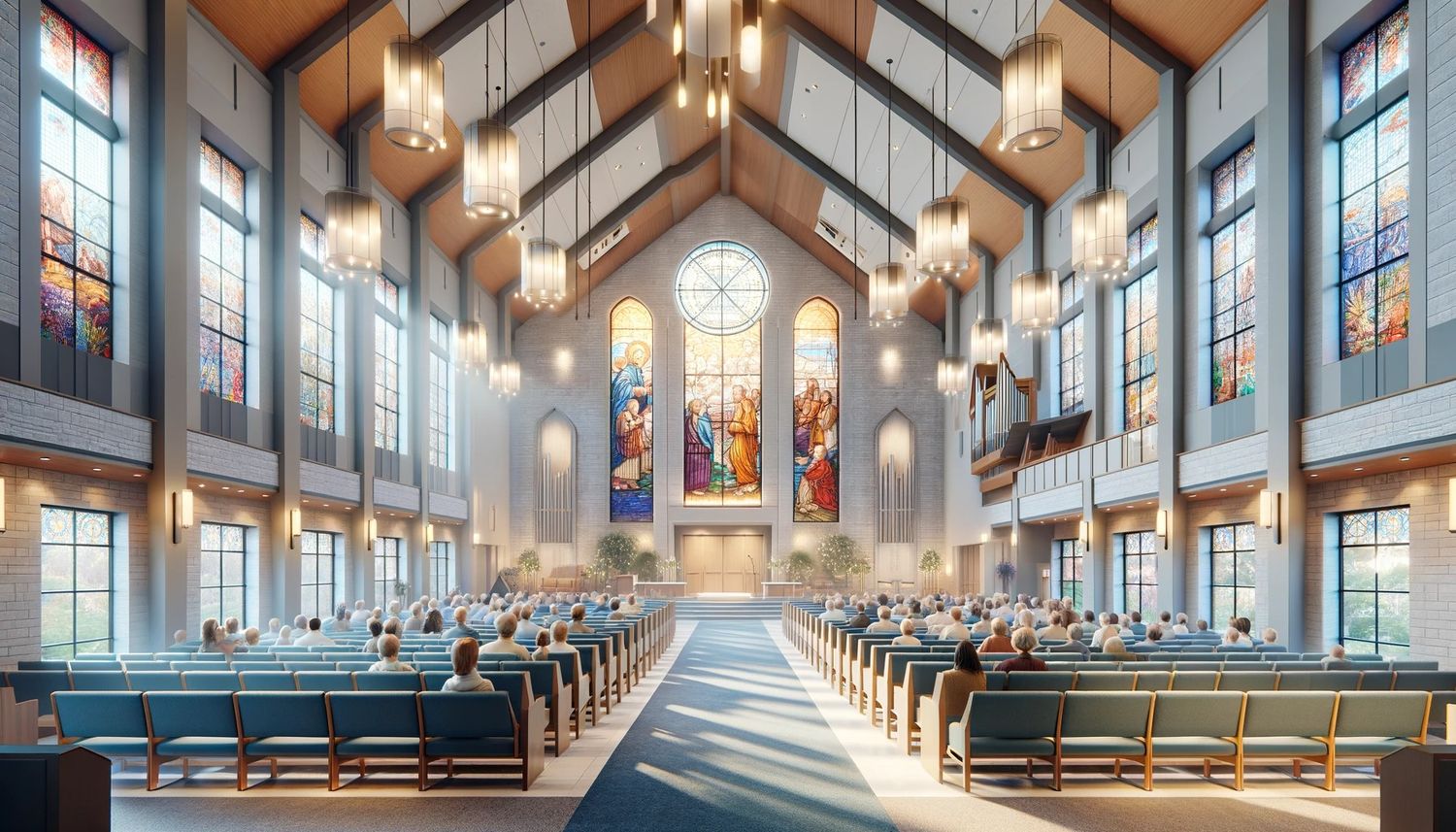Home>Theology and Spirituality>What Are Lutheran Church Services Like


Theology and Spirituality
What Are Lutheran Church Services Like
Published: March 3, 2024
Peter Smith, Editorial Director at Christian.net, combines deep insights into faith, politics, and culture to lead content creation that resonates widely. Awarded for his contributions to religious discourse, he previously headed a major organization for religious communicators, enhancing dialogue on faith's societal impacts.
Discover the unique experience of Lutheran church services and explore the theology and spirituality behind their worship practices. Gain insight into the rich traditions and meaningful rituals of Lutheran worship.
(Many of the links in this article redirect to a specific reviewed product. Your purchase of these products through affiliate links helps to generate commission for Christian.net, at no extra cost. Learn more)
Table of Contents
Introduction
What are Lutheran church services like? Lutheran church services are characterized by a rich tradition of liturgy, hymns, and sacraments. The services are centered around the proclamation of the Word of God and the administration of the sacraments. Lutheran worship is designed to engage the congregation in a meaningful and reverent way, providing a space for spiritual growth and community connection. In this article, we will explore the structure, music, liturgy, and other key elements that make up Lutheran church services. Whether you are a lifelong Lutheran or simply curious about this faith tradition, understanding the components of Lutheran worship can provide insight into the spiritual practices of this Christian denomination.
Structure of Lutheran Church Services
-
Order of Worship: Lutheran church services typically follow a structured order of worship, which may include the following components:
- Invocation: The service begins with an invocation, a call to worship, inviting the congregation to gather in the presence of God.
- Confession and Absolution: This is a time for the congregation to confess their sins and receive God's forgiveness through the absolution pronounced by the pastor.
- Liturgy: The liturgy, or the order of service, includes prayers, responsive readings, and other scripted elements that guide the congregation through the worship experience.
- Scripture Readings: The service includes readings from the Old and New Testaments, often following a prescribed lectionary.
- Sermon: A central part of the service, the sermon is a time for the pastor to expound on the Scripture readings and offer spiritual guidance to the congregation.
- Sacraments: Lutheran services may include the celebration of the sacraments, particularly Holy Communion, which is often offered on a regular basis.
-
Participation: Lutheran worship encourages active participation from the congregation. This may include responsive readings, recitation of prayers, and singing hymns and liturgical music.
-
Seasonal Emphasis: Lutheran church services may vary in emphasis based on the liturgical season, such as Advent, Christmas, Lent, Easter, and Pentecost. Each season brings its own themes and traditions that are reflected in the worship service.
-
Traditional Elements: Lutheran services often incorporate traditional elements such as the use of candles, liturgical colors, and symbolic rituals that have been passed down through generations of worship.
-
Community Involvement: The structure of Lutheran church services also fosters a sense of community and fellowship, providing opportunities for congregants to connect with one another and support each other in their faith journey.
Music and Hymns
Music and hymns play a significant role in Lutheran church services, contributing to the worship experience and the expression of faith. Here are some key aspects of music and hymns in Lutheran worship:
-
Hymnody: Lutherans have a rich tradition of hymnody, with a vast repertoire of hymns that reflect their theology and spirituality. Hymns are sung throughout the service, often aligned with the themes of the liturgical season or the Scripture readings. These hymns are carefully selected to complement the message of the day and engage the congregation in meaningful worship.
-
Choral Music: In addition to congregational singing, Lutheran church services may feature choral music performed by a choir. Choral anthems, motets, and other vocal compositions enhance the musical tapestry of the worship experience, adding depth and beauty to the service.
-
Organ and Instrumental Music: The organ holds a special place in Lutheran worship, providing accompaniment for congregational singing and offering musical interludes during the service. In some Lutheran churches, other instruments such as piano, brass, and strings may also be used to enrich the musical offerings.
-
Liturgical Music: Lutheran worship is enriched by the use of liturgical music, including settings of the liturgy such as the Kyrie, Gloria, Sanctus, and Agnus Dei. These musical settings, often sung in a call-and-response format, contribute to the reverent and structured nature of Lutheran church services.
-
Theological Significance: The hymns and music chosen for Lutheran services are often steeped in theological significance, reflecting the core beliefs and teachings of the Lutheran tradition. Through music, Lutherans express their faith, proclaim the Gospel, and find inspiration for their spiritual journey.
-
Community Participation: Music and hymns provide an opportunity for the congregation to participate actively in worship. The act of singing together fosters a sense of unity and shared devotion, creating a communal expression of praise and thanksgiving.
In Lutheran church services, music and hymns serve as a powerful means of connecting with God, expressing faith, and uniting the worshiping community in a shared spiritual experience.
Liturgy and Sacraments
Liturgy and sacraments are integral components of Lutheran church services, shaping the worship experience and nurturing the faith of the congregation. Here's a detailed look at the significance of liturgy and sacraments in the context of Lutheran worship:
-
Liturgy: The liturgy forms the framework of Lutheran worship, providing a structured and reverent approach to engaging with God. The liturgical elements, including prayers, responsive readings, and scripted rituals, guide the congregation through the service, creating a sense of order and continuity. The use of liturgy in Lutheran church services reflects a deep connection to the historical and theological roots of the faith, emphasizing the continuity of worship practices across generations of believers.
-
Sacraments: Lutherans recognize two sacraments, Baptism and Holy Communion, as central to their faith and worship. Baptism is seen as a sacrament of initiation, marking the entry of an individual into the Christian community and signifying the grace of God at work in their life. Holy Communion, also known as the Eucharist or the Lord's Supper, holds a prominent place in Lutheran services. The sacrament is celebrated as a means of receiving the true body and blood of Christ, strengthening the faith of believers and uniting them with Christ and with one another.
-
Sacramental Theology: The Lutheran approach to sacraments is grounded in sacramental theology, emphasizing the tangible ways in which God's grace is communicated to believers through the physical elements of water, bread, and wine. This sacramental understanding underscores the real presence of Christ in the sacraments, affirming the spiritual nourishment and assurance that believers receive through these sacred acts.
-
Liturgical Seasons and Sacraments: The liturgical calendar influences the celebration of sacraments in Lutheran church services. For example, Baptism may be administered within the context of specific liturgical seasons or on designated feast days, while Holy Communion is often a focal point of worship, particularly on Sundays and during major festivals of the church year.
-
Community Participation in Sacraments: The administration of sacraments in Lutheran services involves active participation from the congregation. Whether through the reaffirmation of baptismal vows, the reception of the Eucharist, or the involvement of the assembly in liturgical responses, sacraments are communal acts that bind the faith community together in shared spiritual experiences.
In Lutheran church services, the integration of liturgy and sacraments serves to deepen the spiritual life of believers, reinforcing their connection to God and to the larger body of Christ. These sacred elements contribute to the richness and depth of Lutheran worship, fostering a sense of reverence, spiritual nourishment, and communal identity within the faith community.
Sermon and Scripture
The sermon holds a central place in Lutheran church services, providing an opportunity for the pastor to expound on the Scripture readings and offer spiritual guidance to the congregation. Here's a closer look at the significance of the sermon and the role of Scripture in Lutheran worship:
-
Exposition of Scripture: The sermon in Lutheran services typically involves the exposition of the Bible, with the pastor delving into the meaning and relevance of the selected Scripture passages. Through the sermon, the congregation is invited to engage with the Word of God, gaining insights into its teachings and how they apply to their lives.
-
Teaching and Encouragement: The sermon serves as a platform for teaching and encouragement, as the pastor addresses theological concepts, ethical principles, and practical aspects of Christian living. The message is designed to edify and inspire the congregation, equipping them to grow in their faith and navigate the challenges of daily life.
-
Relevance to Liturgical Season: The sermon often reflects the themes of the liturgical season or the specific focus of the worship service. For example, during Advent, the sermon may center on the anticipation of Christ's coming, while in Lent, it may emphasize repentance and spiritual renewal. This alignment with the liturgical calendar adds depth and coherence to the worship experience.
-
Application to Contemporary Issues: Lutheran sermons may also address contemporary issues and societal concerns, offering a Christian perspective on relevant topics. This approach underscores the relevance of the Gospel message to the present-day context, encouraging the congregation to consider how their faith intersects with the world around them.
-
Scripture Readings: In addition to the sermon, Lutheran church services feature readings from the Old and New Testaments, often following a prescribed lectionary. These Scripture readings form an integral part of the worship experience, providing the foundation for the sermon and shaping the overall thematic content of the service.
-
Theological Emphasis: Lutheran sermons are characterized by a theological emphasis on the grace of God, the centrality of Christ, and the assurance of salvation through faith. The message typically reflects the core doctrines of the Lutheran tradition, highlighting the redemptive work of Christ and the hope found in the Gospel.
In Lutheran church services, the sermon and Scripture readings combine to offer a holistic approach to engaging with the Word of God, nurturing the spiritual growth of the congregation, and reinforcing the foundational truths of the Christian faith.
Read more: What Is The Lutheran Church
Participation and Community
Participation and community are fundamental aspects of Lutheran church services, fostering a sense of belonging, shared worship, and mutual support among the congregation. Here's a detailed exploration of the significance of participation and community in the context of Lutheran worship:
-
Active Engagement: Lutheran worship encourages active participation from the congregation, inviting them to join in responsive readings, prayers, and hymn singing. This active engagement creates a sense of involvement and ownership in the worship experience, allowing individuals to contribute to the collective expression of faith.
-
Shared Rituals: The shared rituals and liturgical elements in Lutheran services create a communal bond among the worshipers. Whether through the recitation of common prayers, the partaking of sacraments, or the observance of seasonal traditions, the congregation is united in shared acts of worship, reinforcing their identity as a faith community.
-
Fellowship and Support: Lutheran church services provide a space for congregants to connect with one another, offering opportunities for fellowship, mutual encouragement, and spiritual support. The sense of community within the church extends beyond the worship service, fostering relationships that provide strength and companionship in the journey of faith.
-
Inclusivity and Diversity: Lutheran worship embraces inclusivity, welcoming individuals from diverse backgrounds and life experiences. The congregation comes together as a diverse yet unified body, reflecting the broader tapestry of God's people and affirming the value of each person's presence and contribution to the community.
-
Service and Outreach: Participation in Lutheran church services extends to service and outreach, as the congregation seeks to embody the teachings of Christ through acts of compassion, justice, and care for others. The worship experience inspires a spirit of service, prompting congregants to extend the love of God beyond the church walls and into the wider community.
-
Spiritual Formation: Through active participation in Lutheran worship, individuals are nurtured in their spiritual formation, finding opportunities for growth, learning, and discipleship within the context of the faith community. The shared experience of worship becomes a catalyst for personal and communal transformation.
In Lutheran church services, participation and community intertwine to create a vibrant and supportive environment where individuals can express their faith, find connection with others, and collectively bear witness to the grace and love of God. This sense of participation and community forms the heart of Lutheran worship, shaping the spiritual lives of those who gather to worship together.
Conclusion
In conclusion, Lutheran church services are characterized by a structured order of worship, rich musical traditions, the integration of liturgy and sacraments, the centrality of the sermon and Scripture, and a strong emphasis on participation and community. The combination of these elements creates a worship experience that is reverent, spiritually enriching, and deeply rooted in the historical and theological heritage of the Lutheran tradition. Through the structured order of worship, congregants are guided through a cohesive and meaningful worship experience, while the music and hymns contribute to the expression of faith and the communal act of worship. The liturgy and sacraments serve to deepen the spiritual life of believers, reinforcing their connection to God and to the larger body of Christ. The sermon and Scripture readings offer a holistic approach to engaging with the Word of God, nurturing the spiritual growth of the congregation, and reinforcing the foundational truths of the Christian faith. Finally, the emphasis on participation and community fosters a sense of belonging, shared worship, and mutual support among the congregation, creating a vibrant and supportive environment for spiritual growth and fellowship. Overall, Lutheran church services provide a space for individuals to connect with God, express their faith, and find community within the context of a rich and meaningful worship tradition.














